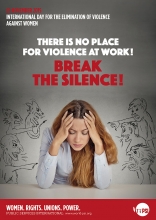25 November: International day for the elimination of violence against women

PSI has produced two posters for the International Day. Download them here.
A humanitarian and refugee crisis has unfolded around the world, with millions of women, men and children fleeing from conflict. Many women and young girls are the victims of trafficking and end up in forced labour. The security of women and children is often at risk in refugee camps, with little or no provision for their specific needs or care. Public service workers are at the frontline receiving asylum seekers and refugees and providing them emergency health, shelter and social services.
PSI stands against all acts of violence and deplores the violent attacks perpetrated recently in Paris, Beirut, Ankara and elsewhere. It is during such atrocities that we witness how crucial public services are, and the need to strengthen rather than weaken their provision. Emergencies like this remind us of the importance of public governance and the provision of quality public services to ensure safety and security for all.
“In all countries, we need a strong commitment from governments to address the deeply rooted causes of violence against women: inequality and discrimination. States must provide adequate measures to prevent violence and protect threatened women, as well as prosecution, counselling and education to change the mentality of people. Shelters for abused women should be provided, and it is unacceptable that under austerity policies those services are abolished in many countries. Governments also need to provide safe harbours for refugees, and ensure that the needs of women and girls are taken into account,” says Rosa Pavanelli, PSI General Secretary.
Just two months ago, the UN adopted its new 2030 Agenda, which is a global agenda for sustainable development that should lead the world out of poverty and save our planet. It offers a historical opportunity to lead us towards a better future and address the structural causes that lead to violence and gender discrimination.
However, this will only be the case if the implementation of this agenda stays clear from the wholesale promotion of public-private partnerships and privatization of public services central to the well-being of women, men and children. Privatization of public services often leads to worse working conditions for public service providers, and reduced access for those in need of social, health, education and other public services.
Juneia Batista, PSI World Women’s Committee Chair, says “Public services are also essential to ensure that unpaid care work by women can be distributed fairly, as well as ensuring a healthy family-work life balance.”
Addressing violence at the workplace is an issue of health and safety at work. In this respect, PSI welcomes the decision of the ILO Governing Body to table a discussion on an international labour standard that addresses gender-based violence at work in 2018. This is the result of proposals and lobbying led by the Workers' group in coordination with the ITUC and Global Union Federations including PSI since 2014. The road is still long, but a first milestone was marked to ensure that violence at work and the consequences of domestic violence at work are covered by international labour law. On 25 November, let’s celebrate this first step towards a global framework that will guide social partners and governments towards the elimination of gender-based violence at work.

